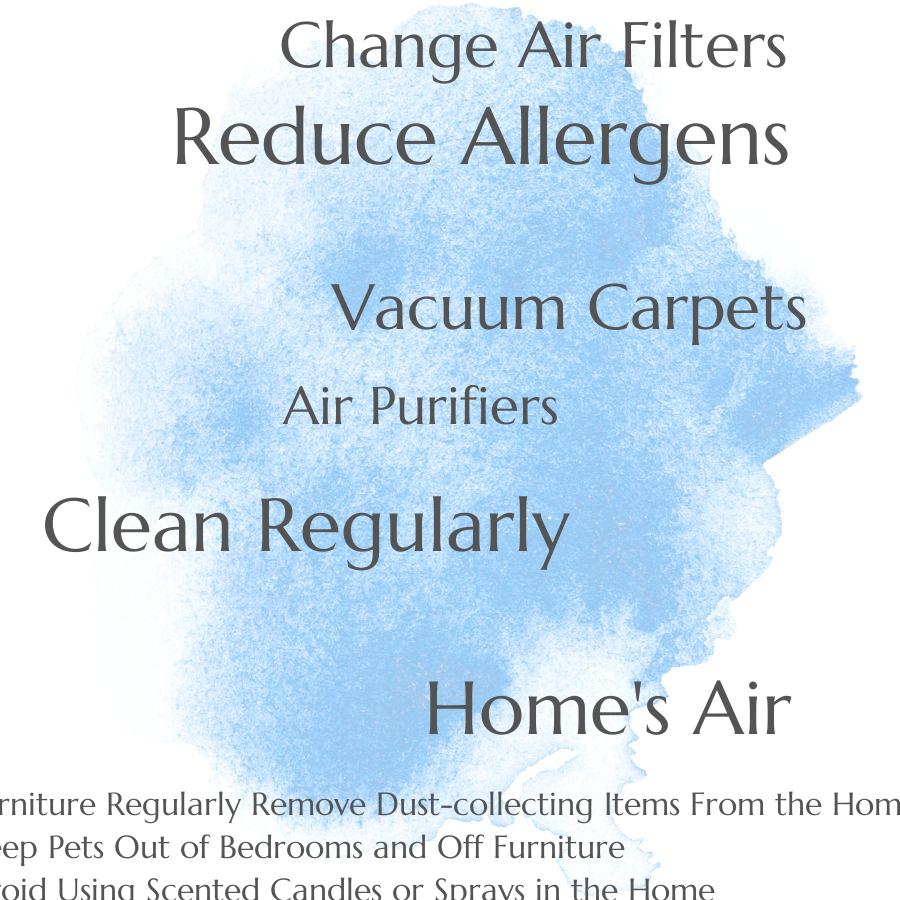You can reduce allergens in your home’s air by using an air purifier, regularly cleaning and vacuuming, using dust mite covers on pillows and mattresses, and avoiding bringing in items that may contain allergens.
If you or someone in your home suffers from allergies, then reducing the allergens in your home’s air is essential for a healthier and more comfortable living environment. Fortunately, there are a few simple steps you can take to reduce the amount of allergens present in your home’s air.
In this blog post, we’ll discuss how to reduce allergens in your home’s air so that everyone can breathe easier.
Clean Regularly

Allergens such as dust, pet dander, and pollen can accumulate over time and cause allergic reactions. To reduce these allergens, it is important to clean regularly.
This includes vacuuming carpets and furniture, mopping floors, wiping down surfaces with a damp cloth or microfiber cloth, and dusting shelves and other surfaces. It is also important to wash bedding weekly in hot water to remove any accumulated allergens from the fabric.
Using a HEPA filter vacuum cleaner can help capture more particles than regular vacuums do. Regularly cleaning your home will help keep the air free of allergens so that you can breathe easier!
Use Air Purifiers
They work by trapping airborne particles, such as dust, pollen, and pet dander, in a filter. This helps to keep the air clean and free from these allergens.
Air purifiers come in many different sizes and styles so you can find one that fits your needs. Some models even have additional features like UV light or ionizers which can further reduce allergens in the air.
Using an air purifier is an effective way to reduce allergens in your home’s air and create a healthier environment for everyone living there.
Change Air Filters Often
Air filters are designed to capture dust, pollen, pet dander and other airborne particles that can trigger allergies. By regularly replacing or cleaning air filters, you can help reduce the amount of allergens circulating through your home’s air.
This will help keep your indoor air clean and free from irritants that could cause allergy symptoms such as sneezing, coughing and itchy eyes. Changing your air filter on a regular basis helps ensure that your HVAC system runs more efficiently which can save energy costs over time.
Vacuum Carpets and Furniture Regularly
Vacuuming helps remove dust, pet dander, pollen, and other particles that can trigger allergies. It’s important to use a vacuum with a HEPA filter so that these particles are trapped inside the machine instead of being released back into the air.
Vacuuming should be done at least once a week to ensure that allergens don’t build up over time. When vacuuming carpets and furniture, it’s best to go slowly and make multiple passes over each area for maximum effectiveness.
Remove Dust-collecting Items From the Home
Dust can contain a variety of allergens, such as pet dander, pollen, and mold spores. To reduce these allergens, it is important to remove any items that are prone to collecting dust.
This includes carpets and rugs, curtains or draperies, upholstered furniture, stuffed animals or toys with fabric surfaces, bookshelves filled with books and knickknacks that collect dust over time. It is also important to regularly vacuum and clean all hard surfaces in the home using a damp cloth or mop.
By removing these dust-collecting items from your home and regularly cleaning them you can significantly reduce the amount of allergens in your air.
Keep Pets Out of Bedrooms and Off Furniture
Pets can carry a lot of allergens on their fur, such as dust mites, pollen, and dander. When they are allowed to roam freely throughout the house or sleep on beds and couches, these allergens can spread quickly through the air.
To reduce this risk, it is best to keep pets out of bedrooms and off furniture at all times. This will help prevent pet-related allergens from entering the air and causing allergic reactions for those living in the home.
Avoid Using Scented Candles or Sprays in the Home
These products often contain fragrances, dyes, and other chemicals that can trigger allergies or asthma symptoms. To reduce allergens in the home, it is best to avoid using scented candles or sprays.
Instead, opt for unscented versions of these products or use natural alternatives such as essential oils diffusers. Make sure to keep windows open when possible to allow fresh air into your home and help reduce indoor air pollution from any scented products you may have used previously.